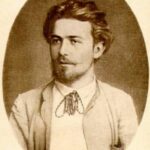Ambitious Mondays: Anton Chekhov edition
“If ever you have need of my life…come and take it.”- Chekhov’s The Seagull
I’ve been obsessed with Chekhov since I first read him as a teenager. God, that sounds so corny and melodramatic, but the heart wants what the heart wants. I remember so clearly spending that first weekend simply devouring his plays. Much of what I read went flying over my head, I lost track of the characters and their long, foreign names…but I was in love with the writing, and the talent. I was awed by this Chekhov, whoever the hell he was, and I wanted more. (You always remember your first time.) In the years since, I’ve read all his works, in both Russian and English. In fact, he was the reason I went to Moscow in the first place, and the reason I decided to study Russian in college. Yes, he’s been dead since 1904 and it’s still a better love story than Twilight.
But people who know about my obsession for Dr. Chekhov, will sometimes cite him, or other literary icons, as reasons they’re having trouble committing to their own gifts. And that’s understandable: the pressure. After all, if you’re still in the process of discovering your own voice, it can be hard to simply appreciate your rough drafts on their own merits, instead of mentally comparing them to Uncle Vanya. Understandable, but not helpful. All that happens is that you lose. You start doubting yourself, and soon, you are unable to accomplish anything.
So, next time you decide that your first or even fifth draft is crap and so what, who cares? Whoa, simma down. For the record, Chekhov wasn’t born ANTON CHEKHOV, author of The Cherry Orchard and Three Sisters. As a young man in his 20s, Chekhov wrote to amuse himself and to support his large family, after his (despotic) father’s failure in business. Chekhov wrote fluff, publishing under various pen names. He didn’t take himself or his talent seriously; he wrote for the money and for the attention in the tabloid press.
Luckily, one of his mentors made Chekhov understand the (potential) talent that he was squandering, giving him a reason to commit to his voice. And still, decades later, despite the extraordinary plays and short stories he had created, on his death bed, Chekhov, in a letter to a relative, confessed that he believed that within a few years of his death, he’d be forgotten, that his works would languish, unread. Whatever his doubts–and he was, obviously, very ill at the end–Chekhov did commit to his remarkable talents. He wrote the plays and short stories within him. In his own words, he “squeezed the slave out” of himself, and despite a childhood of poverty and beatings, he created a new authentic genre of sensitivity and empathy. There is, after all, a reason why people around the world, people who couldn’t pick out Russia on the map, respond so forcefully to Chekhov.
Did he doubt himself, at times? Sure. Who doesn’t? But Chekhov didn’t let his (normal) doubts and insecurities stop him from creating a body of writing that continues to change lives. Think about what Chekhov created, and the life-long journey he took to become ANTON CHEKHOV, the next time you start to talk yourself out of something you’re hungry for: whether or not you change the world, wouldn’t it be enough to simply change your world? You already know the answer to that question. #gettowork
